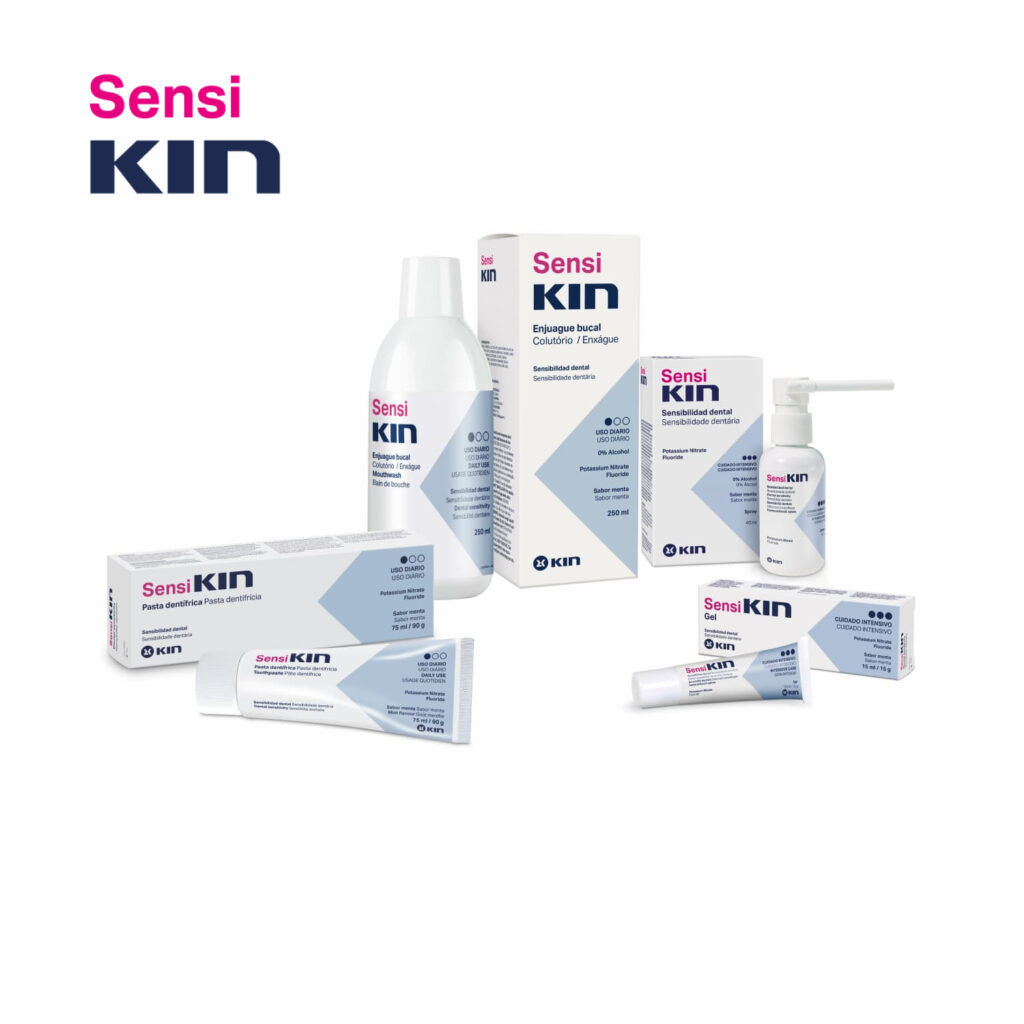If you want to discover the best toothpaste for sensitive teeth, this complete guide will help you choose the product that best suits your needs. Don't let hypersensitivity problems affect your daily life, and act in the right way to prevent and treat them.
Fortunately, nowadays there are different oral care products on the market that can help you fight that sharp pain caused by external stimuli such as cold, heat or foods with high acidity. From KIN we tell you everything you need to know to choose a good toothpaste for tooth sensitivity.
What causes tooth sensitivity?
Teeth are protected by a natural barrier known as enamel. Tooth enamel is the most resistant tissue in the human body, however, it is not exempt from suffering different damages, mainly caused by a series of bad habits that are repeated on a daily basis.
Just below the tooth enamel is dentin, another tissue of high hardness, but which contains thousands of microchannels that connect the outside of the tooth with the pulp. When the enamel is damaged in a particular area and the pulp loses its protection, stimuli from the outside can pass through these small channels, reaching the nerve.
Dental sensitivity is due to the exposure of the nerve to cold, heat, acid sensations or mechanical stimuli. The weaker the enamel layer, the greater the risk of hypersensitivity.
Do you want to know how cold affects our teeth? Don't miss the complete guide you'll find on the KIN blog where we tell you all the details.
How does a toothpaste help you treat sensitivity?
Nowadays, there are many products to combat tooth sensitivity tooth sensitivitysuch as toothpastes. Specifically, there are two types of toothpastes for sensitive teeth, depending on their specific function.
The first group are toothpastes that minimize discomfort by momentarily desensitizing the exposed nerve endings. They are usually fast acting and after use the patient achieves almost immediate relief.
The second group are sensitivity toothpastes that achieve a progressive occlusion of the dentin microtubules. Thanks to their action, external stimuli cannot enter the interior of the tooth, since the channels are 'plugged'. In this case the effect is not as fast, but lasts longer.
How does a toothpaste work for tooth sensitivity?
If you want to know which is the best toothpaste for sensitive teeth, you need to look for the product that best suits your specific case. Each patient has his or her own requirements when it comes to treating dental hypersensitivity problems.
Although there are products that are very effective in preventing or relieving the burning pain associated with hypersensitivity, to achieve a lasting effect it is important to follow a complete treatment.
A toothpaste for tooth sensitivity takes effect gradually, diminishing the sensation as the days go by, while promoting the recovery of the enamel and other damaged tissues.
For this reason it is advisable to use this type of toothpaste on a daily basis.brushing teeth at least 3 times a day, always after every meal. Thanks to their composition, these toothpastes help to eliminate dental plaque, protecting teeth and gums from possible damage. Say goodbye to tooth sensitivity with our specialized products.
Discover our products for tooth sensitivity

How to choose the best toothpaste for sensitive teeth?
As we have already seen, there are two fundamental functions of toothpastes for sensitive teeth, which are of great interest to any type of user: to reduce the sensation of pain in response to external stimuli and to cause a progressive obstruction of the exposed dentin tubules.
To achieve this effect, there are a number of ingredients to look for in order to find the best toothpaste for sensitive teeth. One of the most common is potassium nitrate, a fundamental component of the products in the SensiKIN. In addition, we highlight provitamin B5 and vitamin E acetate, which keep gums much healthier and stronger.
In the same way, it is important not to neglect the content of fluoride, which in a toothpaste for adult use should be of the order of 1450 ppm F-. The function of fluoride will be twofold, as in any other toothpaste for oral hygiene: to help in the remineralization of tooth enamel and to facilitate the progressive obstruction of the dentinal tubules.
How to use a toothpaste and obtain maximum effectiveness?
For proper hygiene and extra protection for sensitive teeth, this type of toothpaste should be used with every brushing, at least 3 times a day, preferably after every meal and before going to bed.
It is important to ensure that brushing is done for 2 minutes, covering the entire surface of the teeth and with a soft-bristled toothbrush. Complement brushing with the use of accessories such as dental floss or interdental brushes.
Along with toothpaste, the use of a Mouthwash further increases the effectiveness of brushing. Choose a product containing potassium nitrate and fluoride to effectively relieve sensitivity, improving enamel quality every day.
If you have any doubts about the best toothpaste for sensitive teeth that you can use, go to your dentist, who will help you find a treatment that suits you.


 What to consider when choosing the best electric toothbrush?
What to consider when choosing the best electric toothbrush? How to relieve pain with newly placed braces?
How to relieve pain with newly placed braces? How to keep your breath fresh?
How to keep your breath fresh?



